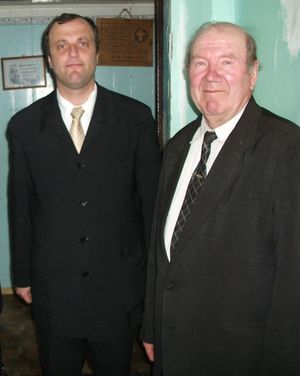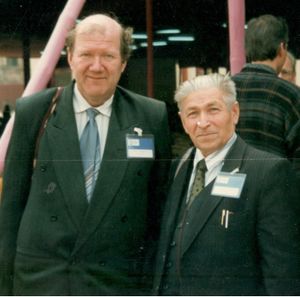Difference between revisions of "Peters, Willi (1940-2016)"
AlfRedekopp (talk | contribs) |
m |
||
| Line 8: | Line 8: | ||
By 1942 Willi’s family found itself in Tayshet in Central [[Siberia (Russia)|Siberia]], a city on the Trans-Siberian Railway, 245 miles east of Krasnoyarsk. Willi’s father, Jakob, had been forced into the ''Trudarmee'' (forced labour camp) and consequently spent years as a logger in the forests of the Tayshet region. The family (Willi, his parents and siblings) were was exceptionally fortunate in that they could live together in Tayshet. Many families were separated from their husband and father. The Peters family remained subject to the Soviet military regime (''kommandatura'') until its dissolution in 1956. At that time the family was permitted to move to the industrial city of Angarsk near Irkutsk. It was there that Willi received his education as an electrician. | By 1942 Willi’s family found itself in Tayshet in Central [[Siberia (Russia)|Siberia]], a city on the Trans-Siberian Railway, 245 miles east of Krasnoyarsk. Willi’s father, Jakob, had been forced into the ''Trudarmee'' (forced labour camp) and consequently spent years as a logger in the forests of the Tayshet region. The family (Willi, his parents and siblings) were was exceptionally fortunate in that they could live together in Tayshet. Many families were separated from their husband and father. The Peters family remained subject to the Soviet military regime (''kommandatura'') until its dissolution in 1956. At that time the family was permitted to move to the industrial city of Angarsk near Irkutsk. It was there that Willi received his education as an electrician. | ||
| − | By the late 1950s ethnic Germans were permitted more internal movement within the Soviet Union and they began to look for family and friends. In the early 1960s Willi began looking for a wife from among these former friends and found one in | + | By the late 1950s ethnic Germans were permitted more internal movement within the Soviet Union and they began to look for family and friends. In the early 1960s Willi began looking for a wife from among these former friends and found one in Maria Guenther, who had been born in Chortitza in 1941. He went to Berdsk in Central Siberia to marry her in October 1967, and then they returned to the city of Angarsk where their three children were born during the next several years. In 1976 they moved to Berdsk, and almost immediately joined the large Mennonite congregation that was meeting on the western fringe of Novosibirsk under the leadership of Bernhard Sawatzky. Willi began to regularly sing in the choir. Willi was also asked to preach occasionally starting in 1986. During the late 1980s many of these ethinic German Mennonites were leaving the Soviet Union for [[Germany]], creating a significant leadership void. It was in May 1990 that Willi, as a 50 year-old, was called and ordained to the ministry in this Mennonite Church at Novosibirsk. However, he also continued his career as an electrician. When his firm collapsed in 1990, he received support from family and church members who had settled in [[Bielefeld (Nordrhein-Westfalen, Germany)|Bielefeld]], Germany, so that he could continue to live in Novosibirsk and served the church. |
[[File:Villi Peters and Nicolai Dueckman.jpg|300px|thumb|right|''Willi Peters and Nikolai Dueckman, 1997.<br>Photo: Courtesy of Ben Falk.'']] | [[File:Villi Peters and Nicolai Dueckman.jpg|300px|thumb|right|''Willi Peters and Nikolai Dueckman, 1997.<br>Photo: Courtesy of Ben Falk.'']] | ||
He visited Germany several times after 1990. In January, 1997, Willi made a most memorable trip when he and Nikolai Dueckman from the Evangelical Mennonite Brethren congregation in Marianovka near [[Omsk (Siberia, Russia)|Omsk]], attended the [[Mennonite World Conference]] sessions in [[Calcutta (India)|Calcutta]], [[India]]. However, later that year he suffered his first stroke, with more to follow. His son, Andrei, was already assisting him in the ministry and took more and more responsibility after that. Willi Peters passed away on 20 April 2016 in Novosibirsk and is buried in Berdsk. | He visited Germany several times after 1990. In January, 1997, Willi made a most memorable trip when he and Nikolai Dueckman from the Evangelical Mennonite Brethren congregation in Marianovka near [[Omsk (Siberia, Russia)|Omsk]], attended the [[Mennonite World Conference]] sessions in [[Calcutta (India)|Calcutta]], [[India]]. However, later that year he suffered his first stroke, with more to follow. His son, Andrei, was already assisting him in the ministry and took more and more responsibility after that. Willi Peters passed away on 20 April 2016 in Novosibirsk and is buried in Berdsk. | ||
Latest revision as of 06:10, 13 September 2019
Willi Peters : electrician and minister; born 30 April 1940 in Rosengart, Chortitza, in the Soviet Union to Jakob Peters (1916-??) and Maria (Toews) Peters (1914-??). He married Maria Guenther (1941-). They had three children together – Anna, Andrei and Katharina. He died in Novosibirsk, Russia on 20 April 2016.
Willi Peters was born a year before Germany’s massive attack on the Soviet Union in June 1941, which resulted in the Supreme Soviet Edict of 28 August 1941 which decreed that all ethnic Germans in western USSR would be deported away from the approaching German army.
By 1942 Willi’s family found itself in Tayshet in Central Siberia, a city on the Trans-Siberian Railway, 245 miles east of Krasnoyarsk. Willi’s father, Jakob, had been forced into the Trudarmee (forced labour camp) and consequently spent years as a logger in the forests of the Tayshet region. The family (Willi, his parents and siblings) were was exceptionally fortunate in that they could live together in Tayshet. Many families were separated from their husband and father. The Peters family remained subject to the Soviet military regime (kommandatura) until its dissolution in 1956. At that time the family was permitted to move to the industrial city of Angarsk near Irkutsk. It was there that Willi received his education as an electrician.
By the late 1950s ethnic Germans were permitted more internal movement within the Soviet Union and they began to look for family and friends. In the early 1960s Willi began looking for a wife from among these former friends and found one in Maria Guenther, who had been born in Chortitza in 1941. He went to Berdsk in Central Siberia to marry her in October 1967, and then they returned to the city of Angarsk where their three children were born during the next several years. In 1976 they moved to Berdsk, and almost immediately joined the large Mennonite congregation that was meeting on the western fringe of Novosibirsk under the leadership of Bernhard Sawatzky. Willi began to regularly sing in the choir. Willi was also asked to preach occasionally starting in 1986. During the late 1980s many of these ethinic German Mennonites were leaving the Soviet Union for Germany, creating a significant leadership void. It was in May 1990 that Willi, as a 50 year-old, was called and ordained to the ministry in this Mennonite Church at Novosibirsk. However, he also continued his career as an electrician. When his firm collapsed in 1990, he received support from family and church members who had settled in Bielefeld, Germany, so that he could continue to live in Novosibirsk and served the church.
He visited Germany several times after 1990. In January, 1997, Willi made a most memorable trip when he and Nikolai Dueckman from the Evangelical Mennonite Brethren congregation in Marianovka near Omsk, attended the Mennonite World Conference sessions in Calcutta, India. However, later that year he suffered his first stroke, with more to follow. His son, Andrei, was already assisting him in the ministry and took more and more responsibility after that. Willi Peters passed away on 20 April 2016 in Novosibirsk and is buried in Berdsk.
Willi Peters is remembered for his strong sense of call to remain in Novosibirsk, not emigrating like so many others, and his ability to relate with many people in a friendly manner.
Bibliography
Klippenstein, Lawrence. "Willi Peters (1940-2016): Siberian Mennonite Pastor." Heritage Posting, 93 (June 2019): 10.
| Author(s) | William Yoder |
|---|---|
| Date Published | June 2019 |
Cite This Article
MLA style
Yoder, William. "Peters, Willi (1940-2016)." Global Anabaptist Mennonite Encyclopedia Online. June 2019. Web. 16 Apr 2024. https://gameo.org/index.php?title=Peters,_Willi_(1940-2016)&oldid=164536.
APA style
Yoder, William. (June 2019). Peters, Willi (1940-2016). Global Anabaptist Mennonite Encyclopedia Online. Retrieved 16 April 2024, from https://gameo.org/index.php?title=Peters,_Willi_(1940-2016)&oldid=164536.
©1996-2024 by the Global Anabaptist Mennonite Encyclopedia Online. All rights reserved.

